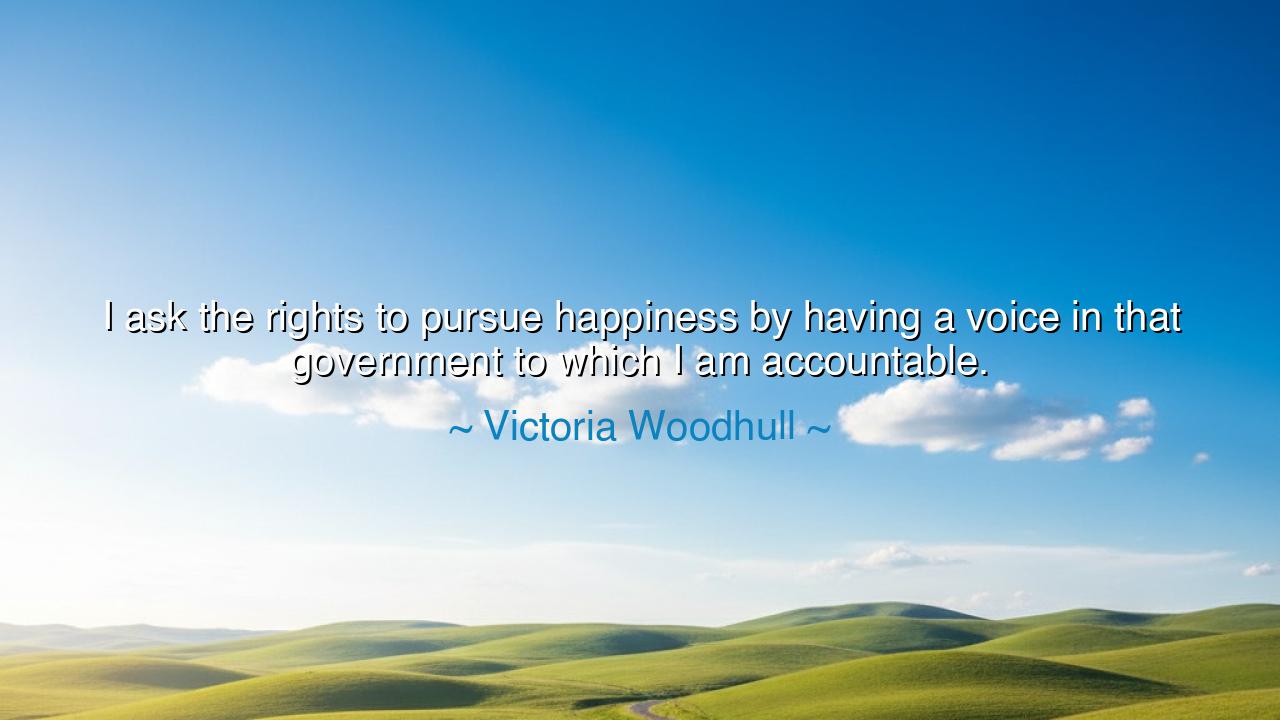
I ask the rights to pursue happiness by having a voice in that
I ask the rights to pursue happiness by having a voice in that government to which I am accountable.






When Victoria Woodhull declared, “I ask the rights to pursue happiness by having a voice in that government to which I am accountable,” she was not merely uttering a plea — she was sounding a revolutionary trumpet in the struggle for human dignity. Her words burned with the spirit of a woman who refused to be silent, who demanded that the sacred promise of liberty be made whole. For in her time, women were bound by laws they did not make, judged by rulers they could not choose, and held accountable to a government in which they had no voice. Her declaration was both defiance and truth: that the pursuit of happiness is hollow when the soul is voiceless, and that freedom without representation is but another form of bondage.
To understand her cry, we must look to the 19th century, an age of towering change and unyielding restraint. Victoria Woodhull — born in poverty, self-taught, and relentless — rose from obscurity to become the first woman to run for President of the United States in 1872. She lived in a time when women could not vote, own property independently, or participate fully in public life. Yet she spoke as one who had glimpsed a higher order of justice — the belief that every being accountable to the law must have a voice in its making. To her, democracy that silences half its citizens is not democracy at all, but tyranny disguised in the robes of civility.
Her words find their roots in the Declaration of Independence, where Jefferson proclaimed that all men are endowed with the right to life, liberty, and the pursuit of happiness. But Woodhull, standing on the shoulders of centuries of silent women, extended that vision — she asked, what does the pursuit of happiness mean if the law denies you a say in shaping it? Her plea was not for privilege, but for justice; not for favor, but for fairness. She believed that to hold someone accountable without granting them a voice is to violate the very foundation of moral order. And thus, she demanded that the promises of the founders be fulfilled not in word, but in truth.
Her struggle was not fought alone. Before her came Abigail Adams, who wrote to her husband, “Remember the ladies.” After her came Susan B. Anthony, who cast her illegal ballot and was arrested for it, declaring that resistance was the duty of the governed when government denies representation. These women, like Woodhull, did not seek rebellion — they sought inclusion. They did not demand dominion — only equality in accountability, the right to stand as full citizens under the same sky of liberty. Through their voices, democracy was purified, its foundation tested, and its promise reborn.
The emotional power of Woodhull’s declaration lies in its moral symmetry: she did not ask for happiness to be given, but for the right to pursue it — to earn it through effort, wisdom, and participation. That right, she insisted, could not exist without a voice. For silence breeds submission, and submission kills the human spirit. When one is denied the power to speak in one’s own governance, the light within grows dim. To have a voice is to be human; to be denied one is to be reduced to property, a shadow under the weight of another’s will.
In history’s long arc, her cry was vindicated. The 19th Amendment, ratified in 1920, enshrined women’s right to vote. It came too late for Victoria Woodhull to witness, but not too late for her words to live. They became part of the great river of liberty that flows through time — from the abolition of slavery to the civil rights movement, from the fall of kings to the rise of the people. Every victory for freedom carries within it the echo of her demand: that those who bear the burdens of government must also share its power.
And yet, her message endures not only as history, but as warning. For even in our modern age, there are voices still unheard, communities still excluded, hearts still unseen by the systems that govern them. The spirit of Woodhull calls out to each generation: speak, and let others speak; build governments that listen as well as rule. Never permit authority to silence the governed, nor comfort to excuse apathy.
The lesson of her life is clear and eternal: the pursuit of happiness begins with the right to be heard. Those who would live free must guard that right not only for themselves, but for all others — for democracy is not a gift but a guardianship. Let her words be carved in memory: happiness withers in silence, and liberty dies when the governed fall mute. Therefore, speak with courage, act with justice, and remember that the truest freedom is not the absence of restraint, but the presence of a voice that shapes its own destiny.






AAdministratorAdministrator
Welcome, honored guests. Please leave a comment, we will respond soon